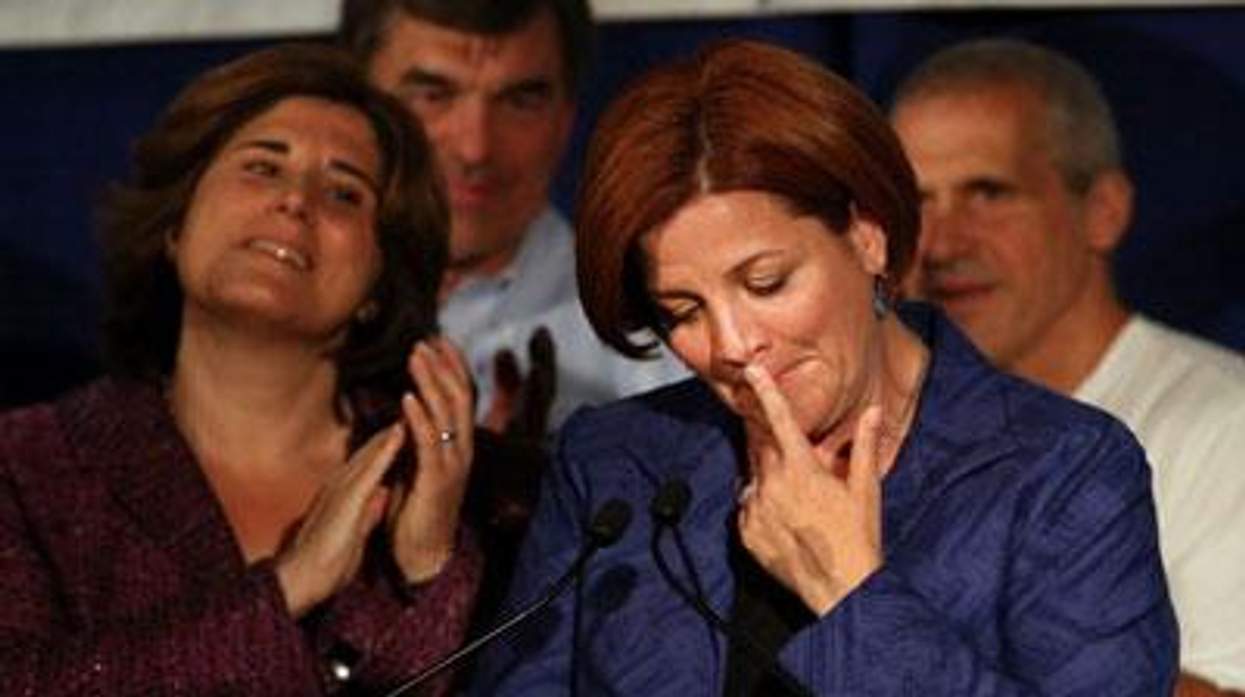On a Tuesday night in mid-May, I was anxiously awaiting to see my cover story on LGBT opposition to New York City mayoral candidate Christine Quinn in The Village Voice. At the time, Quinn, speaker of the City Council and the second most important person in city politics (after Mayor Michael Bloomberg), was the perceived front-runner in the September 10 Democratic mayoral primary.
What I didn't expect was a scorched-earth email from Quinn's press representative. I thought I tried to fairly weigh Quinn's often-controversial policy positions, her fiery temperament, her rise to power, and the historic importance of having an openly gay person running the nation's largest city.
Quinn began her career early in her 20s as a housing advocate but first gained notice as the campaign manager for Tom Duane's successful 1991 campaign to win a seat on the City Council. After running the Anti-Violence Project, which fights LGBT-related hate crimes in the city, she took over Duane's City Council seat when he became a state senator.
I'm second to none in my admiration for Duane. He was not only one of the first two out LGBT members of the City Council, but equally important, during that campaign, he announced that he was HIV-positive -- the first politician ever to do so. He was, and remains after retirement, the only openly LGBT member of the state Senate.
I had interviewed Tom over two dozen times and always appreciated how freely he speaks his mind. I knew how proud he was that his protege might become mayor. But I wasn't prepared for the dripping sarcasm about the vocal group of LGBT New Yorkers working so avidly to defeat Quinn in her mayoral bid.
Duane called the protesters "people who are sad and unhappy. I've taken a magic marker and written on poster board many times. It doesn't take a tremendous amount of skill."
Not skill, perhaps, but dedication and even a certain amount of courage. Seeing them behind a police barricade as well-heeled donors filed into a Victory Fund champagne brunch illustrated their effort spent trying to counter the perception that LGBT New Yorkers had to support Quinn because she is a lesbian.
Looking back on Quinn's surprisingly swift implosion from front-runner to third-place also-ran, I believe that studiously avoiding these detractors rather than engaging them in a dialogue was a sign of her overall campaign strategy. From the start, Quinn tried to convey an aura of inevitability. But her staff should have realized that the opposition was more than a few scraggly outliers. Just as my article appeared, an invitation went out for an LGBT benefit for Bill de Blasio, the eventual victor in the Democratic mayoral primary. The host committee was a long list of many of the city's best-known LGBT personalities, from downtown drag queens and kings like Lady Bunny and Murray Hill to Broadway stars like Cherry Jones, Alan Cummings, and Cynthia Nixon.
Quinn, meanwhile, was racking up endorsements from second-wave feminists (Gloria Steinem); the major gay organizations (Victory Fund, the Human Rights Campaign, and the Empire State Pride Agenda, the state's principal LGBT lobbying group); the city's senior politicians; the editorial pages of the three major daily newspapers; and the power brokers in the business community.
In politics, as in football, it's easy to be a Monday morning quarterback. But the pile-up of endorsements from the city's establishment looks as though it may have worked against her. De Blasio, who as the city's public advocate acted as an ombudsman between citizenry and government, was able to portray himself as an outsider.
Both Duane and Quinn herself presented a strong case to me of the difficulties trying to bargain with some of the world's most powerful businessmen -- and even in New York, they're still nearly all men. But the city has become weary of Mayor Michael Bloomberg's arrogant leadership style. Voters saw Quinn as his obvious successor, and said, "No, thanks."
Exit polls showed that more than a third of LGBT voters also did not jibe with the idea of an heir to Gracie Mansion. Just as my immigrant grandmother in Brooklyn pulled the lever for anyone whose last name sounded Jewish, so was it once with LGBT voters. But today, there's a lesbian U.S. senator, Tammy Baldwin of Wisconsin; a lesbian mayor of Houston, Annise Parker; several gay, lesbian, or bisexual members of the House of Representatives; and many more out officeholders. There have been openly gay people as heads of governments of two European nations, and mayors of Paris and Berlin. If Quinn's defeat tells us anything, it's that we have finally moved away from identity politics.
On the other hand, Joe Lhota, the Republican who will face de Blasio in the general election, marched in the inclusive, counter-St. Patrick's Day parade. He has gone on record supporting marriage equality -- arguably a moot point, since at this point there's not much the mayor of New York can do about it. But still, Lhota calls himself, in his words, a "classic northeast Republican," which puts him to the left of many Democrat officeholders in much of the country.
In New York we may have the luxury of discarding the symbolic importance of a major victory for one of our own. But in large swaths of the country, LGBT officeholders can affect the daily lives of their constituents. Not backing an LGBT candidate may be a luxury they still cannot afford.
STEVE WEINSTEIN has written about politics and LGBT issues for The Village Voice, Out, and The Advocate, among other publications. He is the author of The Q Guide to Fire Island (Alyson, 2007).















Charlie Kirk DID say stoning gay people was the 'perfect law' — and these other heinous quotes
These are some of his worst comments about LGBTQ+ people made by Charlie Kirk.